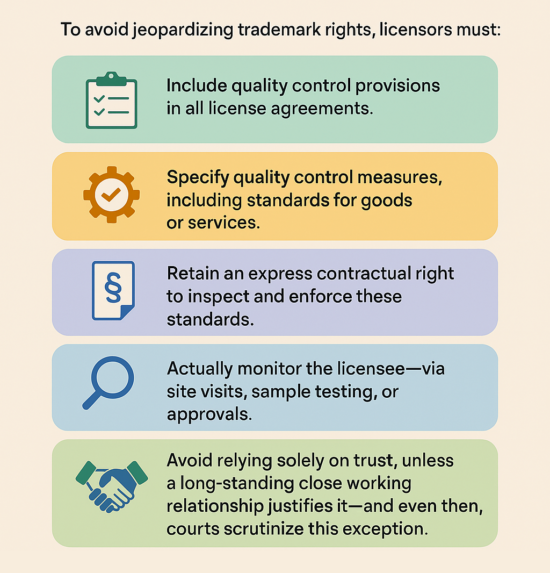
Trademarks serve as source identifiers, enabling consumers to distinguish the goods or services of one party from those of others. This function allows consumers to rely on trademarks as indicators of consistent quality, fostering valuable goodwill associated with the mark. Trademark owners often leverage this established reputation and value by extending their brand reach through licensing agreements with third parties. These arrangements can be mutually beneficial, generating revenue for the trademark owner and allowing licensees to operate under a recognized brand. However, this practice carries inherent risks if not managed carefully, as uncontrolled licensing can lead to the erosion and eventual loss of trademark rights.
The core principle underlying the naked licensing doctrine is that trademark owners need to maintain adequate control over the quality of goods or services produced or offered by licensees. The failure to do so can undermine the very purpose of a trademark, leading to consumer deception and the potential abandonment of the mark.
Naked licensing is raised as an affirmative defense in trademark infringement litigation to challenge the validity of the plaintiff’s trademark rights. The defense asserts that the trademark owner failed to exercise adequate quality control over a licensee’s use of the trademark, effectively abandoning the mark. If successful, this defense can be fatal to the infringement claim, as abandonment means the mark no longer functions as a source identifier and is unenforceable under the Lanham Act. Courts will evaluate whether the plaintiff maintained specific quality control measures, conducted meaningful supervision, or relied on a close working relationship that justified limited oversight. If the plaintiff cannot demonstrate actual control during the license period, the court may deem the mark abandoned—eliminating the basis for asserting trademark infringement. Thus, naked licensing not only rebuts liability but may extinguish the plaintiff’s valuable trademark rights altogether.
A finding of naked licensing can lead to a particular trademark being deemed abandoned. Rooted in the essential function of trademarks to signify consistent quality to consumers, this doctrine imposes a duty on trademark owners to maintain adequate quality control when they engage in trademark licensing. Naked licensing arises when a trademark owner licenses the use of the trademark but fails to exercise control over the quality standards of the goods or services offered by the licensee. In such cases, courts may hold that the mark has lost its distinctive character, rendering it no longer a reliable indicator of source and deem it abandoned.
Written trademark license agreements are essential in properly controlling licensed use of a trademark. In the context of enforcing a trademark in litigation, courts evaluate both whether the license agreement includes specific quality control measures and whether the licensor exercises meaningful supervision over the licensee's operations. A license agreement that includes contractual rights to inspect or approve products, conduct site visits, or review marketing materials helps support a finding of actual control. However, even with an express contractual framework, the trademark owner must actually exercise control.
A well-drafted written license agreement is the cornerstone of an effective trademark licensing relationship. It not only evidences the parties' intentions but also establishes a legal structure that supports the licensor's ability to exercise control over the licensee's use of the trademark. Without a written agreement containing enforceable quality control terms, the trademark owner's rights are exposed to attack by third parties asserting naked licensing and trademark abandonment.
To avoid these risks, trademark owners should ensure that any trademark license agreement contains comprehensive quality control provisions tailored to the particular goods or services being licensed. These provisions should explicitly state the quality standards that the licensee must adhere to and specify the licensor's right to monitor and enforce those standards. This may include submitting product samples for approval, allow site visits, or comply with detailed branding and marketing guidelines to ensure consistent quality.
Further, the agreement should grant the licensor an express contractual right to terminate the license in the event of quality control failures. Courts often view such termination clauses as evidence that the trademark owner retains ultimate authority over the use of the mark. The inclusion of periodic reporting requirements, submission of advertising materials for review, and performance benchmarks can also strengthen the licensor's position.
Importantly, the written agreement should also define the permitted use of the trademark, specifying the geographic scope, channels of trade, and nature of the products or services sold under the licensed mark. Limiting the scope of the license and requiring prior approval for any expansions helps prevent unauthorized or inconsistent uses that could diminish the distinctive character of the mark.
The touchstone case Kentucky Fried Chicken Corp. v. Diversified Packaging Corp., 549 F.2d 368 (5th Cir. 1977) involved a license granted by KFC to Diversified Packaging for the production of food packaging materials bearing KFC's trademarks. Although the license agreement did not set forth extensive quality control procedures, the court found that KFC's oversight—through approval of packaging designs and maintenance of product standards—was sufficient to avoid a finding of naked licensing. The court held that KFC's ability to review and approve the packaging materials ensured that consumers would continue to associate the mark with a consistent level of quality. The key takeaway from the case is that the level of control need not be onerous or frequent; rather, it must be reasonable under the circumstances to protect the source-identifying function of the mark.
In contrast, the Seventh Circuit in Eva's Bridal Ltd. v. Halanick Enterprises, Inc. reached the opposite result based on the complete lack of quality control. In that case, the original Eva's Bridal store had licensed the name to a family member operating an independent bridal salon. Despite the familial relationship, there was no written agreement, no oversight, and no supervision of the licensee's operations. The licensor neither inspected the store nor monitored the services provided. The court found this to be a textbook case of naked licensing, holding that "a mark is abandoned when the licensor fails to exercise adequate quality control over the licensee."
The policy rationale in Eva's Bridal rests on the consumer protection function of trademark law: trademarks serve as a signal of consistent quality and commercial source. Allowing licensing without oversight would erode consumer confidence and diminish the mark's significance. The Seventh Circuit made clear that personal trust, even within a family, is not a substitute for actual control.
Together, these cases demonstrate the balancing act courts perform: while KFC reflects a pragmatic tolerance for minimal but effective control, Eva's Bridal illustrates the risks of informality and assumptions of trust.
In FreecycleSunnyvale v. The Freecycle Network, the Ninth Circuit affirmed a finding that The Freecycle Network (TFN) had abandoned its trademark through naked licensing. TFN, a nonprofit organization promoting reuse through local community groups, allowed affiliated groups to use the Freecycle mark without formal license agreements or specific quality control measures. The court emphasized that TFN failed to exercise actual control over its licensees’ activities, did not conduct site visits, or enforce quality standards. While TFN argued that its members shared a common mission and that oversight was unnecessary, the court rejected this, reiterating that even informal networks must maintain adequate quality control to preserve trademark rights. The decision illustrates that nonprofit status or alignment in purpose does not excuse the obligation to monitor trademark use.
The case of Blue Mountain Holdings Ltd. v. Bliss Nutraceuticals LLC involved a dispute over the "VIVAZEN" trademark, used for kratom-based products. Lighthouse Enterprises, a Barbados-based holding company, owned the trademark and entered into a "Brand Sale Agreement" with Blue Mountain Holdings. Despite being labeled a sale, the Eleventh Circuit Court of Appeals agreed with the district court's assessment that the agreement constituted a license because Lighthouse retained certain interests in the mark. Subsequently, Blue Mountain and Lighthouse jointly sued Bliss Nutraceuticals for trademark infringement. In defense, Bliss argued that Lighthouse had abandoned its trademark rights by engaging in naked licensing, specifically by failing to exercise adequate control over Blue Mountain's use of the mark.
The Eleventh Circuit upheld the district court's finding of naked licensing. The appellate court's determination rested on the fact that Lighthouse, despite retaining some control over the trademark, engaged in no meaningful supervision or inspection of the products bearing the VIVAZEN mark that were being sold by Blue Mountain. The court emphasized that the substance of the agreement and the actual conduct of the parties were paramount, noting that the labeling of the transaction as a "sale" was not dispositive. Testimony from officials of both Lighthouse and Blue Mountain confirmed unequivocally that Lighthouse had never supervised Blue Mountain's production, marketing, or sale of the products. This lack of oversight led the court to conclude that Lighthouse had abandoned quality control, resulting in the abandonment of the trademark itself. This case underscores the critical importance of actual quality control in licensing arrangements, even when the agreement purports to be a sale or assignment.
Lawn Managers, Inc. v. Progressive Lawn Managers, Inc., 959 F.3d 903 (8th Cir. 2020)
The case of Lawn Managers, Inc. v. Progressive Lawn Managers, Inc. involved a trademark infringement suit brought by Lawn Managers against Progressive Lawn Managers. Progressive, in turn, counterclaimed for cancellation of Lawn Managers' trademark, alleging naked licensing, and also raised the defense of unclean hands. The dispute arose from the dissolution of a business partnership between Zweifel and Smith, where Smith continued to operate a similar lawn care business under a licensing agreement with Zweifel, using the "Lawn Managers" mark. The licensing agreement did not contain explicit contractual provisions for quality control, and there was no evidence of actual control exercised by Lawn Managers over Progressive's operations. The district court ruled in favor of Lawn Managers, awarding damages and attorney's fees, which Progressive appealed.
The Eighth Circuit Court of Appeals affirmed the district court's judgment, specifically agreeing with the finding that naked licensing had not occurred. The appellate court reasoned that Zweifel, as the licensor, could reasonably rely on Smith's quality control efforts due to their long-term business relationship and the structure of the licensing agreement. The court noted that the agreement allowed Smith to operate a similar business using the same name and equipment, which implied a continuity in the quality of services provided. Furthermore, the court observed that there was no evidence presented of any deviations in quality at Progressive during the period of the license. The adversarial nature of the post-divorce relationship between the parties was not deemed sufficient to negate the trust in Smith's ability to maintain service quality. The provided snippets do not mention any dissenting or concurring opinions in this case. However, legal commentary suggests that this decision has been subject to criticism for potentially overlooking the consumer protection aspect of trademark law by prioritizing the licensor's reliance on the licensee without more stringent quality control measures. This case illustrates a scenario where a pre-existing close working relationship can, in certain circumstances, mitigate the need for formal quality control in a licensing agreement.

Failure to follow these guidelines invites arguments of trademark abandonment, which may lead to an avoidable loss of intellectual property that can undermine a company’s entire brand equity.
Courts consistently hold that without actual control—whether through site visits, review of marketing materials, or specific quality control measures—a trademark owner risks trademark abandonment and loss of valuable trademark rights. While courts may tolerate some flexibility depending on context, the overarching rule is clear: trademark owners must proactively manage the use of the trademark to ensure consistent quality in the goods or services offered by licensees.
The risks of failing to comply are high, but they are avoidable through well-drafted license agreements and diligent oversight. Trademark counsel plays a vital role in structuring and maintaining licensing frameworks that protect the mark's distinctive character and integrity in the marketplace.
For assistance with trademark licensing or other trademark-related matters, please contact us to discuss how we can help protect and strengthen your intellectual property portfolio.
© 2025 Sierra IP Law, PC. The information provided herein does not constitute legal advice, but merely conveys general information that may be beneficial to the public, and should not be viewed as a substitute for legal consultation in a particular case.

"Mark and William are stellar in the capabilities, work ethic, character, knowledge, responsiveness, and quality of work. Hubby and I are incredibly grateful for them as they've done a phenomenal job working tirelessly over a time span of at least five years on a series of patents for hubby. Grateful that Fresno has such amazing patent attorneys! They're second to none and they never disappoint. Thank you, Mark, William, and your entire team!!"
Linda Guzman

Sierra IP Law, PC - Patents, Trademarks & Copyrights
FRESNO
7030 N. Fruit Ave.
Suite 110
Fresno, CA 93711
(559) 436-3800 | phone
BAKERSFIELD
1925 G. Street
Bakersfield, CA 93301
(661) 200-7724 | phone
SAN LUIS OBISPO
956 Walnut Street, 2nd Floor
San Luis Obispo, CA 93401
(805) 275-0943 | phone
SACRAMENTO
180 Promenade Circle, Suite 300
Sacramento, CA 95834
(916) 209-8525 | phone
MODESTO
1300 10th St., Suite F.
Modesto, CA 95345
(209) 286-0069 | phone
SANTA BARBARA
414 Olive Street
Santa Barbara, CA 93101
(805) 275-0943 | phone
SAN MATEO
1650 Borel Place, Suite 216
San Mateo, CA, CA 94402
(650) 398-1644. | phone
STOCKTON
110 N. San Joaquin St., 2nd Floor
Stockton, CA 95202
(209) 286-0069 | phone
PORTLAND
425 NW 10th Ave., Suite 200
Portland, OR 97209
(503) 343-9983 | phone
TACOMA
1201 Pacific Avenue, Suite 600
Tacoma, WA 98402
(253) 345-1545 | phone
KENNEWICK
1030 N Center Pkwy Suite N196
Kennewick, WA 99336
(509) 255-3442 | phone
2023 Sierra IP Law, PC - Patents, Trademarks & Copyrights - All Rights Reserved - Sitemap Privacy Lawyer Fresno, CA - Trademark Lawyer Modesto CA - Patent Lawyer Bakersfield, CA - Trademark Lawyer Bakersfield, CA - Patent Lawyer San Luis Obispo, CA - Trademark Lawyer San Luis Obispo, CA - Trademark Infringement Lawyer Tacoma WA - Internet Lawyer Bakersfield, CA - Trademark Lawyer Sacramento, CA - Patent Lawyer Sacramento, CA - Trademark Infringement Lawyer Sacrament CA - Patent Lawyer Tacoma WA - Intellectual Property Lawyer Tacoma WA - Trademark lawyer Tacoma WA - Portland Patent Attorney - Santa Barbara Patent Attorney - Santa Barbara Trademark Attorney